Ever since I started paying closer attention to my health, I’ve realized how much of a difference the right choices can make. One of the most impactful changes I’ve made is focusing on my diet to support my immune system. It’s not just about avoiding illness—it’s about feeling energized, strong, and ready to take on the day.
Through trial and error, I’ve discovered that certain natural ingredients can truly make a difference. From vitamin-packed fruits to antioxidant-rich vegetables, these everyday foods have become staples in my kitchen. They’ve helped me feel more resilient, especially during those busy weeks when stress tries to take over.
In this article, I’ll share my top picks for maintaining a strong immune system. These aren’t just random choices—they’re backed by science and my own personal experience. Whether you’re looking to stay healthy during flu season or simply want to feel your best, these options are worth considering.
Key Takeaways
- A diverse diet rich in vitamins and minerals supports a healthy immune system.
- Vitamin C, found in citrus fruits and red bell peppers, plays a key role in immunity.
- Natural foods like garlic, ginger, and yogurt can enhance your body’s defenses.
- Antioxidants in fruits and vegetables help reduce inflammation and fight infections.
- Hydration and balanced nutrition are essential for overall health and immunity.
Introduction to Immune-Boosting Foods
Understanding how my body defends itself has been a game-changer for my health journey. I’ve learned that certain nutrients can strengthen my immune system, helping it fight off infections more effectively. This isn’t just about avoiding colds—it’s about feeling strong and resilient every day.
Boosting your immune system often involves increasing the production of white blood cells. These cells are your body’s first line of defense against harmful invaders. For example, vitamin C is known to enhance white blood cell production, making it a key nutrient for immune health.
Scientific research backs the role of specific nutrients in supporting the system. Studies show that vitamins like C and E, as well as minerals like zinc, play a crucial part in maintaining a robust immune response. Incorporating these into your diet can make a noticeable difference.
I’ve personally seen how small changes in my meals can improve my overall health. Planning everyday meals with nutrient-rich ingredients has become a priority for me. It’s not just about eating well—it’s about giving my body the tools it needs to stay strong.
What It Means to Boost Your Immune System
When we talk about boosting the immune system, we’re referring to enhancing its ability to protect the body. This includes increasing the production of white blood cells, which are essential for fighting infections. Nutrients like vitamin C and zinc are critical for this process.
Research highlights the importance of a balanced diet in maintaining a healthy system. For instance, the Mediterranean diet has been linked to improved white blood cell counts in adults. This shows how everyday food choices can have a lasting impact on your health.
Incorporating immune-supporting foods into your routine doesn’t have to be complicated. Simple swaps, like adding citrus fruits or leafy greens to your meals, can make a big difference. It’s about making choices that support your body’s natural defenses.
The Role of Nutrition in a Healthy Immune System
Exploring the connection between what I eat and how my body defends itself has been eye-opening. I’ve learned that certain nutrients play a vital role in keeping my immune system strong. It’s not just about avoiding illness—it’s about giving my body the tools it needs to function at its best.
Nutrients like vitamin C, zinc, and antioxidants are essential for maintaining a robust defense system. These elements help my body produce and maintain healthy white blood cells, which are crucial for fighting off infections. Without them, my immune system wouldn’t be as effective.
Key Nutrients for Immune Function
Vitamin C is one of the most well-known nutrients for supporting immunity. It helps increase the production of white blood cells, which are the body’s first line of defense. I’ve found that adding citrus fruits like oranges and lemons to my diet makes a noticeable difference.
Zinc is another critical nutrient. It helps regulate the function of immune cells and supports the body’s ability to heal. Foods like nuts, seeds, and beans are excellent sources of zinc. Antioxidants, found in colorful fruits and vegetables, also play a key role in reducing inflammation and protecting cells from damage.
How Food Affects White Blood Cells
The food I eat directly impacts the performance of my white blood cells. For example, beta-carotene, found in carrots and sweet potatoes, helps enhance the activity of these cells. This means my body can respond more effectively to threats like viruses and bacteria.
Research shows that a diet rich in these nutrients can improve both innate and adaptive immunity. Innate immunity is the body’s immediate response to invaders, while adaptive immunity involves a more targeted approach. By focusing on nutrient-dense food, I’m supporting both aspects of my immune health.
Incorporating these elements into my meals doesn’t have to be complicated. Simple choices, like adding spinach to my smoothies or snacking on almonds, can make a big difference. It’s about making small, consistent changes that add up over time.
Foods to Boost Immunity
Over time, I’ve learned that what I eat plays a huge role in how my body defends itself. Certain nutrients, like vitamin C and zinc, are essential for maintaining a strong immunity. These elements help my body produce white blood cells, which are crucial for fighting infections.
Citrus fruits, such as oranges and lemons, are packed with vitamin C. This nutrient is known to increase white blood cell production, making it a key player in immune health. I’ve found that adding these fruits to my daily meals helps me feel more resilient.
🏃 Start Your Weight Loss Journey Now!
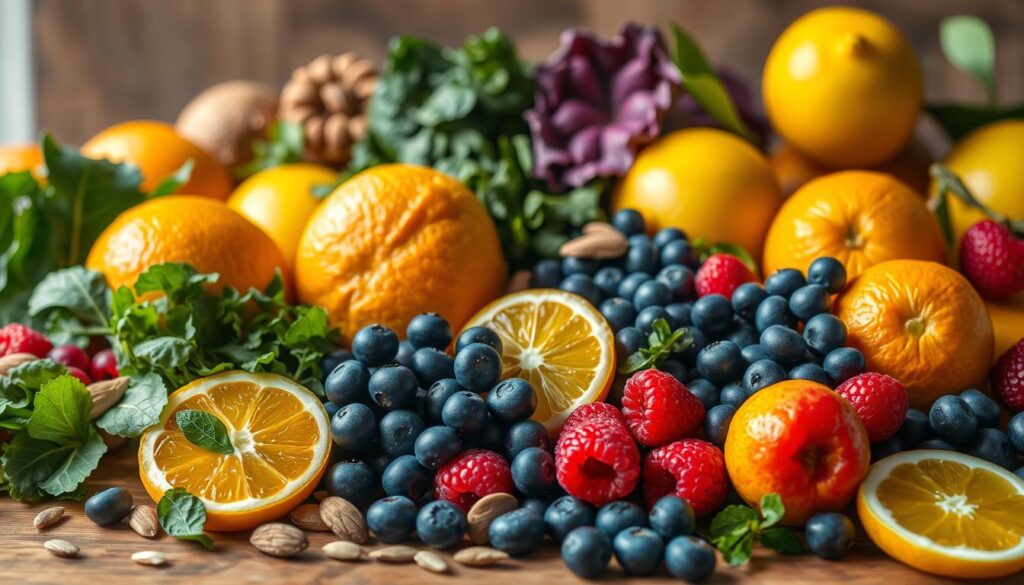
Another important nutrient is zinc, which regulates immune cell function. Foods like nuts, seeds, and beans are excellent sources. I often snack on almonds or add chickpeas to my salads to ensure I’m getting enough zinc.
Antioxidants also play a vital role in supporting immunity. They reduce inflammation and protect cells from damage. Colorful fruits and vegetables, like bell peppers and spinach, are rich in these compounds. Incorporating them into my diet has made a noticeable difference in my overall health.
Daily Intake Recommendations
Here’s a quick guide to the recommended daily amounts of key nutrients for immune health:
| Nutrient | Daily Amount | Food Sources |
|---|---|---|
| Vitamin C | 90 mg (men), 75 mg (women) | Oranges, bell peppers, broccoli |
| Zinc | 11 mg (men), 8 mg (women) | Nuts, seeds, beans |
| Vitamin E | 15 mg | Almonds, sunflower seeds, spinach |
Maintaining a balanced diet filled with these nutrient-rich foods is essential for ongoing wellness. It’s not just about avoiding illness—it’s about giving your body the tools it needs to stay strong and resilient every day.
Citrus Fruits: A Burst of Vitamin C
Incorporating citrus fruits into my daily routine has transformed how I approach my health. These vibrant fruits, like oranges, lemons, and limes, are packed with vitamin C, a nutrient essential for supporting the body’s natural defenses. I’ve found that adding them to my meals not only enhances flavor but also boosts my overall well-being.
Oranges, Lemons, and Limes Explained
Oranges are a standout source of vitamin C, with one medium orange providing 100% of the daily recommended intake. Lemons and limes, while often used in smaller quantities, are equally powerful. Their tangy flavor makes them perfect for dressings, drinks, and even desserts.
Research shows that vitamin C stimulates the production of white blood cells, which are crucial for fighting infections. This makes citrus fruits a valuable addition to any diet focused on maintaining a strong immune function.
Daily Vitamin C Recommendations
Meeting your daily vitamin C needs is easier than you might think. Here’s a quick guide to help you plan your meals:
| Citrus Fruit | Vitamin C Content | Serving Size |
|---|---|---|
| Orange | 70 mg | 1 medium |
| Lemon | 30 mg | 1 medium |
| Lime | 20 mg | 1 medium |
I often start my day with a glass of freshly squeezed orange juice or add lemon slices to my water. For lunch, a citrus-based salad dressing can brighten up any dish. These small changes have made a big difference in how I feel.
Scientific studies support the benefits of vitamin C, linking its consumption to improved immune responses. By including citrus fruits in my daily meals, I’m giving my body the tools it needs to stay strong and resilient.
Vibrant Vegetables for Immune Support
Adding vibrant vegetables to my meals has become a cornerstone of my health routine. These colorful additions not only brighten up my plate but also play a crucial role in supporting my body’s natural defenses. I’ve found that vegetables like broccoli and spinach are particularly effective in reducing the risk of infection and maintaining overall wellness.
Broccoli’s Nutrient Power
Broccoli is a standout in my kitchen for its impressive nutrient profile. Packed with vitamins A, C, and E, it’s a triple threat for supporting the white blood cells that fight off invaders. I’ve learned that minimal cooking, like steaming or microwaving, helps preserve these essential nutrients. This ensures that my body gets the full effect of broccoli’s immune-boosting properties.
Spinach and Optimal Nutrient Absorption
Spinach is another favorite of mine, especially for its ability to promote nutrient absorption. Even when lightly cooked, spinach retains its high levels of vitamins and minerals. Research shows that these nutrients help maintain a robust immune response, making spinach a must-have in my daily meals. I often add it to smoothies or sauté it with garlic for a quick, nutrient-packed side dish.
Here’s a quick breakdown of the key nutrients in broccoli and spinach:
| Vegetable | Key Nutrients | Benefits |
|---|---|---|
| Broccoli | Vitamins A, C, E | Supports white blood cell production |
| Spinach | Iron, Folate, Vitamin K | Enhances nutrient absorption and immune function |
Incorporating these vegetables into my diet has made a noticeable difference in how I feel. Whether it’s a broccoli stir-fry or a spinach salad, these simple choices help me stay strong and resilient.
Superfoods Rich in Antioxidants
I’ve discovered that certain superfoods can significantly enhance my body’s natural defenses. Among these, red bell peppers and berries stand out for their exceptional antioxidant content. These ingredients not only add vibrant flavors to my meals but also play a crucial role in supporting my overall health.
🚀 Boost Your Metabolism & Lose Weight!
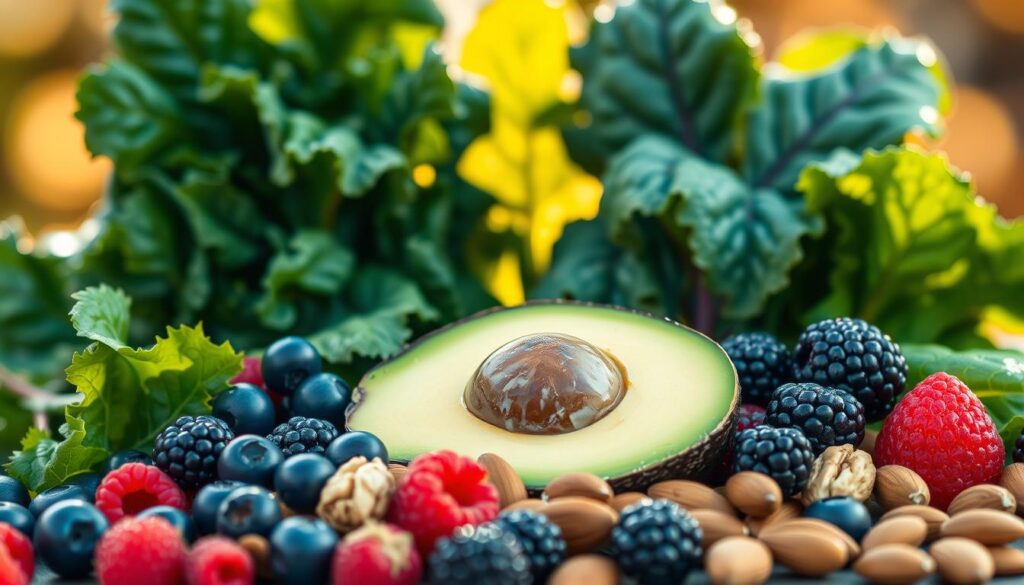
Red Bell Peppers: A Vitamin C Powerhouse
Red bell peppers are a standout in my kitchen. Surprisingly, they contain more vitamin C than most citrus fruits. This nutrient is essential for the production of blood cells, which are vital for fighting off infections. I often add them to salads or roast them for a sweet, nutritious side dish.
Research shows that vitamin C also helps reduce oxidative stress, lowering the risk of chronic disease. By incorporating red bell peppers into my diet, I’m giving my body the tools it needs to stay strong and resilient.
Berries: Nature’s Antioxidant Gems
Berries, especially blueberries, are another favorite of mine. They’re packed with antioxidants that protect cells from damage and support immune function. I’ve found that adding a handful of berries to my morning oatmeal or smoothie is an easy way to boost my nutrient intake.
Studies highlight the role of antioxidants in maintaining healthy blood cells and reducing inflammation. This makes berries a delicious and effective choice for long-term health. Plus, their natural sweetness satisfies my cravings without added sugar.
Here’s a quick comparison of the antioxidant content in common berries:
| Berry | Antioxidant Content (per cup) |
|---|---|
| Blueberries | 13,427 |
| Strawberries | 5,938 |
| Raspberries | 6,058 |
Incorporating these superfoods into my meals has made a noticeable difference in how I feel. Whether it’s a colorful salad or a refreshing smoothie, these simple choices help me stay strong and energized.
The Healing Powers of Garlic and Ginger
Exploring the natural remedies in my kitchen has been a revelation for my health. Two ingredients that stand out are garlic and ginger. These spices have been used for centuries, not just for flavor but for their remarkable health benefits. I’ve found that incorporating them into my meals has made a noticeable difference in how I feel.
Garlic: The Ancient Antibiotic
Garlic has a long history as a natural antibiotic. Its sulfur-containing compounds, like allicin, are known to stimulate the immune system. Research shows that these compounds can increase the production of white blood cells, which are essential for fighting infections. I often add minced garlic to soups, stir-fries, or even salad dressings to reap its benefits.
Studies suggest that garlic may help reduce inflammation and lower the risk of chronic conditions. For example, a 2020 review found that garlic supplements significantly reduced markers of inflammation like C-reactive protein. This makes garlic a powerful addition to any diet focused on long-term health.
Ginger: Soothing Inflammation Naturally
Ginger is another spice I rely on for its anti-inflammatory properties. Its active compound, gingerol, has been shown to reduce inflammation and ease nausea. I’ve found that ginger tea is particularly soothing, especially during colder months or when I’m feeling under the weather.
Research indicates that ginger may help with conditions like arthritis by reducing pain and swelling. A 2020 review highlighted its effectiveness in lowering inflammatory markers. Adding fresh ginger to smoothies, teas, or even baked goods is an easy way to incorporate it into your routine.
Both garlic and ginger are versatile and can be used in a variety of dishes. Whether it’s a garlic-infused stir-fry or a ginger-spiced smoothie, these spices offer both flavor and health benefits. By making them a regular part of my meals, I’ve noticed a significant improvement in my overall well-being.
Yogurt and Probiotics for Gut Health and Immunity
Maintaining a healthy gut has become a priority in my wellness routine, and yogurt has played a key role in this journey. I’ve learned that the gut microbiome is closely linked to the immune system, and probiotics in yogurt can significantly enhance this connection. By choosing the right yogurt, I’ve noticed improvements in my overall health and resilience.
Yogurt acts as a medium for beneficial probiotics, which support gut health. These live cultures help balance the gut microbiome, which in turn strengthens the body’s defenses. Research shows that a healthy gut can lower the risk of infections and improve immune function. This makes yogurt a valuable addition to any diet focused on wellness.
Choosing the Right Yogurt with Live Cultures
Not all yogurts are created equal. I always look for labels that say “live and active cultures” to ensure I’m getting the full benefits. These probiotics can help reduce the risk of digestive issues and support a robust immune response. I also avoid yogurts with added sugars, opting for plain or lightly sweetened varieties.
Fortified yogurts are another great option, as they often contain vitamin D. This nutrient is essential for immune health and can enhance the body’s ability to fight off infections. Studies suggest that vitamin D plays a crucial role in maintaining healthy blood cells, which are vital for overall wellness.
Here’s a quick comparison of different yogurt types and their benefits:
| Yogurt Type | Key Features | Benefits |
|---|---|---|
| Plain Yogurt | Live active cultures, no added sugars | Supports gut health, reduces inflammation |
| Greek Yogurt | High protein, live active cultures | Enhances satiety, supports muscle repair |
| Fortified Yogurt | Added vitamin D, live active cultures | Boosts immune function, strengthens bones |
Incorporating yogurt into my daily meals has made a noticeable difference in how I feel. Whether it’s a morning smoothie or a midday snack, this simple choice helps me stay strong and healthy.
Nuts and Seeds: Tiny Powerhouses of Vitamin E
I’ve always been fascinated by how small changes in my diet can lead to big improvements in my health. One of the most impactful additions has been nuts and seeds. These tiny snacks are packed with essential nutrients, especially vitamin E, which plays a key role in supporting my body’s defenses.
Almonds and sunflower seeds are my go-to choices. They’re rich in vitamin E, a powerful antioxidant that protects cells from oxidative stress. This nutrient helps maintain a healthy level of white blood cells, which are crucial for fighting off harmful bacteria and infections.
What makes these snacks even more beneficial is their healthy fat content. These fats aid in the absorption of fat-soluble vitamins like vitamin E, ensuring my body gets the most out of every bite. Research shows that even a small handful of nuts or seeds can make a significant difference in immune health.
Here’s a quick breakdown of the key nutrients in almonds and sunflower seeds:
| Nut/Seed | Key Nutrients | Benefits |
|---|---|---|
| Almonds | Vitamin E, Magnesium | Protects cells, supports immune function |
| Sunflower Seeds | Vitamin E, Selenium | Reduces inflammation, enhances immunity |
Incorporating these into my daily routine is simple. I sprinkle them on salads, blend them into smoothies, or enjoy them as a quick snack. Their versatility makes it easy to reap their benefits without much effort.
Scientific data highlights the importance of vitamin E in maintaining a strong immune level. The recommended daily intake is 15 mg for adults, which can easily be met with a handful of almonds or sunflower seeds. By making these small additions, I’ve noticed a significant improvement in my overall health and resilience.
Spices That Stimulate the Immune System
Spices have always been a secret weapon in my kitchen, not just for flavor but for their health benefits. Over time, I’ve discovered that certain spices can significantly enhance my body’s natural defenses. These ingredients, like turmeric and ginger, are more than just culinary staples—they’re powerful tools for maintaining wellness.
What makes spices so effective is their ability to modulate immune responses. For example, curcumin, the active compound in turmeric, has been shown to reduce inflammation and support immune cell function. This makes it a valuable addition to any diet focused on long-term health.
Turmeric for Anti-Inflammatory Benefits
Turmeric has become a staple in my daily routine. Its active ingredient, curcumin, is known for its anti-inflammatory properties. Research shows that curcumin can help regulate the immune system by balancing the activity of specific immune cells. This ability makes turmeric a standout spice for supporting overall health.
Incorporating turmeric into meals is easy. I often add it to soups, smoothies, or even scrambled eggs. Its vibrant color and earthy flavor make it a versatile ingredient that can enhance almost any dish. Here’s a quick guide to using turmeric in your meals:
- Add a teaspoon to your morning smoothie for an anti-inflammatory boost.
- Mix it into soups or stews for added flavor and health benefits.
- Use it as a seasoning for roasted vegetables or grilled meats.
Scientific studies highlight the long-term benefits of turmeric. A 2017 review found that curcumin can reduce oxidative stress and inflammation, which are linked to chronic conditions. By making turmeric a regular part of my diet, I’ve noticed a significant improvement in my overall well-being.
Integrating Spices into Daily Meals
One of the best ways to reap the benefits of spices is by incorporating them into everyday meals. For example, ginger can be used in teas or stir-fries, while cinnamon adds warmth to oatmeal or baked goods. This variety ensures that you’re not only enjoying flavorful meals but also supporting your immune system.
Here’s a quick comparison of common spices and their benefits:
| Spice | Key Benefits |
|---|---|
| Turmeric | Reduces inflammation, supports immune function |
| Ginger | Eases nausea, soothes inflammation |
| Cinnamon | Regulates blood sugar, adds warmth to dishes |
By experimenting with different spices, I’ve found a way to make healthy eating enjoyable and sustainable. Whether it’s a turmeric latte or a ginger-infused stir-fry, these small changes have made a big difference in how I feel.
Spices are more than just flavor enhancers—they’re a variety of natural remedies that can support your immune system and overall health. By incorporating them into your meals, you’re not only adding depth to your dishes but also giving your body the tools it needs to stay strong and resilient.
Boosting Immunity Through Balanced Diet Planning
Planning my meals has become a cornerstone of my daily routine, ensuring I stay healthy and energized. A balanced diet is more than just eating the right foods—it’s about creating a process that supports my body’s natural defenses. By focusing on nutrient-rich ingredients and thoughtful combinations, I’ve noticed a significant improvement in my overall well-being.
Meal Prep Strategies for Daily Health
Meal prep has been a game-changer for me. It saves time and ensures I have healthy options readily available. I start by planning my meals for the week, focusing on ingredients rich in vitamins and minerals. For example, I include nuts and seeds for their selenium content, which supports immune function.
To maximize nutrient retention, I cook in batches and store meals in airtight containers. This process not only keeps food fresh but also makes it easier to stick to my health goals. Research shows that proper meal prep can enhance the body’s ability to fight off pathogens, making it a crucial part of my routine.
Combining Foods for Maximum Benefit
Combining certain foods can create synergistic effects, enhancing nutrient absorption. For instance, pairing spinach with citrus fruits increases iron uptake, thanks to the vitamin C. I also love adding turmeric to black pepper, as it boosts the absorption of curcumin, a powerful anti-inflammatory compound.
Here’s a quick guide to some of my favorite food pairings:
- Spinach + Citrus Fruits: Enhances iron absorption.
- Turmeric + Black Pepper: Boosts curcumin uptake.
- Nuts + Berries: Provides a mix of selenium and antioxidants.
These combinations not only taste great but also support my body’s ability to combat pathogens. By incorporating them into my meals, I’ve noticed a significant improvement in my energy levels and overall health.
Thoughtful diet planning is an ongoing process that requires attention and consistency. By focusing on nutrient-rich ingredients and effective meal prep strategies, I’ve created a routine that supports my immune system and keeps me feeling my best every day.
Research and Scientific Perspectives on Immune Foods
Diving into the latest research has given me a fresh perspective on how diet influences my body’s defenses. Recent studies have shown that certain nutrients can significantly enhance the immune response, helping the body fight off infections more effectively. This isn’t just about short-term fixes—it’s about building long-term resilience through consistent, thoughtful choices.

One key finding is the importance of time in seeing the benefits of a nutrient-rich diet. Research indicates that consistent intake of vitamins like C and D, as well as minerals like zinc, can improve the body’s ability to produce and maintain healthy white blood cells. This process doesn’t happen overnight but builds over weeks and months.
Another critical factor is sleep. Studies suggest that poor sleep can weaken the immune response, making it harder for the body to absorb and utilize nutrients effectively. Ensuring adequate rest is just as important as eating the right foods for maintaining a strong defense system.
Mechanisms Behind Food and Immune Health
Understanding how specific foods influence immune cell activity has been fascinating. For example, antioxidants in berries and leafy greens help reduce oxidative stress, which can damage cells and weaken the immune response. Similarly, probiotics in yogurt support gut health, which is closely linked to overall immunity.
Clinical trials have also highlighted the role of certain nutrients in enhancing the immune response. Vitamin D, for instance, has been shown to reduce the risk of respiratory infections, while zinc can shorten the duration of colds. These findings reinforce the importance of a balanced diet for long-term health.
Implications for Daily Choices
This research has reshaped how I approach my meals. I now prioritize foods rich in vitamins, minerals, and antioxidants, knowing they play a direct role in supporting my body’s defenses. It’s not just about eating well—it’s about making choices that enhance my immune response over time.
Ongoing studies continue to shape our understanding of immune health. As new findings emerge, I’m reminded that nutrition is a dynamic field. Staying informed and adaptable is key to making the best choices for my well-being.
Lifestyle Factors Complementing Immune-Boosting Foods
Balancing my lifestyle has been just as important as choosing the right foods. While a nutrient-rich diet lays the foundation for a strong immune system, factors like exercise, sleep, and stress management play a crucial role in enhancing its effectiveness. I’ve learned that these elements work together to create a holistic approach to wellness.
Exercise, Sleep, and Stress Management
Regular exercise has become a non-negotiable part of my routine. Studies show that moderate physical activity, like a 30-minute walk, can improve immune function. It’s not about intense workouts but consistency. I’ve found that even light activities, such as yoga or stretching, make a noticeable difference in how I feel.
Sleep is another cornerstone of my health strategy. Research indicates that 7 to 9 hours of quality sleep each night supports the body’s ability to fight infections. I’ve prioritized a bedtime routine that includes winding down with a book or calming music to ensure I get the rest I need.
Managing stress has been equally important. Chronic stress can weaken the immune system, so I’ve incorporated mindfulness practices like meditation and deep breathing into my day. As one study notes,
“Stress reduction techniques can significantly enhance immune response.”
Practical Tips for Everyday Wellness
Here are some simple changes I’ve made to support my overall health:
- Start the day with a short walk or stretching session.
- Set a consistent sleep schedule to improve rest quality.
- Practice mindfulness for at least 10 minutes daily.
These small adjustments have had a big impact on my well-being. By combining a balanced diet with these lifestyle habits, I’ve noticed a significant improvement in my energy levels and resilience.
Scientific findings reinforce the importance of this holistic approach. For example, a 2020 study highlighted that regular exercise and adequate sleep can enhance the health benefit of nutrient-rich foods. This synergy ensures that my body is equipped to handle whatever comes its way.
Incorporating these practices doesn’t require drastic changes. It’s about making consistent, thoughtful choices that support your body’s natural defenses. By focusing on both diet and lifestyle, I’ve created a routine that keeps me feeling strong and healthy every day.
Seasonal Tips for Incorporating Immune Foods
Seasonal eating has taught me how to maximize flavor and nutrition throughout the year. By focusing on fresh, locally available produce, I’ve discovered that my meals not only taste better but also provide the essential nutrients my body needs to stay strong. Adapting my diet to the changing seasons has become a key part of my health routine.
Seasonal Grocery Picks and Meal Ideas
Each season brings its own bounty of antioxidant-rich ingredients. In the fall, I stock up on squash, sweet potatoes, and apples. Winter is perfect for citrus fruits and dark leafy greens, while spring offers fresh berries and asparagus. Summer is all about tomatoes, peppers, and zucchini. By aligning my grocery list with the seasons, I ensure my meals are packed with nutrition and flavor.
Here’s a quick guide to seasonal meal ideas:
- Fall: Roasted butternut squash soup with a side of apple salad.
- Winter: Citrus and kale salad topped with roasted chickpeas.
- Spring: Asparagus and quinoa bowl with a lemon-ginger dressing.
- Summer: Grilled vegetable skewers with a fresh tomato salsa.
One of my favorite seasonal ingredients is ginger. It’s versatile and adds a warming kick to both sweet and savory dishes. In the colder months, I use it in soups and teas, while in the summer, it’s perfect for refreshing smoothies and dressings.
Adapting to seasonal availability doesn’t just enhance flavor—it also ensures I’m getting the most antioxidant benefits. For example, berries are at their peak in the summer, providing maximum nutrients. By eating seasonally, I’m supporting my body’s natural defenses year-round.
| Season | Key Ingredients | Health Benefits |
|---|---|---|
| Fall | Squash, Apples | Rich in vitamins A and C |
| Winter | Citrus, Kale | High in vitamin C and iron |
| Spring | Berries, Asparagus | Packed with antioxidants |
| Summer | Tomatoes, Peppers | High in vitamins C and E |
As one study notes,
“Seasonal eating ensures a diverse intake of nutrients, which is essential for maintaining a strong immune system.”
By embracing seasonal eating, I’ve found a sustainable way to stay healthy and enjoy my meals. It’s a simple yet effective strategy that anyone can incorporate into their routine.
Debunking Myths About Immune-Boosting Diets
Navigating the world of health claims has taught me the importance of separating fact from fiction. Over the years, I’ve encountered countless myths about what truly supports our body’s defenses. Let’s dive into some of the most common misconceptions and uncover the truth.
One popular myth is that taking large doses of supplements can instantly strengthen your immune function. While vitamins like C and D are essential, excessive intake can be harmful. A study published in 2020 found that over-supplementing can lead to toxicity, especially in children. Instead, I focus on getting these nutrients from whole foods like citrus fruits and fortified yogurt.
⏳ Exclusive Offer Just for You!

Another misconception is that certain foods, like garlic or ginger, can act as miracle cures. While these ingredients do have anti-inflammatory properties, they’re not a one-size-fits-all solution. As one expert noted,
“No single food can replace a balanced diet and healthy lifestyle.”
I’ve found that incorporating these foods into a varied diet works best for me.
Flawed claims often surround overhyped supplements, promising quick fixes for immune health. Research shows that many of these products lack scientific backing. For example, a 2021 study revealed that some immune-boosting supplements contained minimal active ingredients. Instead, I prioritize natural sources of nutrients, like nuts and seeds, which are rich in vitamin E and zinc.
Understanding how specific foods support immune function has been eye-opening. For instance, antioxidants in berries and leafy greens help reduce oxidative stress, which can weaken the body’s response to infections. By including these in my meals, I’ve noticed a significant improvement in my overall health.
Personal anecdotes have also shaped my approach. I once tried a trendy detox diet, only to feel exhausted and unwell. This experience taught me to be skeptical of fad diets and focus on long-term, sustainable choices. As one study suggests, consistency in diet and lifestyle is key to maintaining a strong immune system.
Continuous research is essential in this field. New findings often challenge old beliefs, reminding us to stay informed. For example, recent studies highlight the role of gut health in immune function, emphasizing the importance of fiber and probiotics. By staying curious and critical, I’ve built a diet that truly supports my well-being.
Conclusion
Taking small steps toward better health has shown me the power of consistent, thoughtful choices. Throughout this article, I’ve shared my top picks for supporting the body’s natural defenses, from citrus fruits to yogurt rich in probiotics. These ingredients, when combined, create a balanced diet that offers long-term benefits.
It’s important to remember that no single food is a cure-all. Instead, the cumulative effect of nutrient-dense choices, like antioxidant-rich berries and vitamin-packed vegetables, makes the real difference. Adding yogurt to your routine can also enhance gut health, which plays a key role in overall wellness.
I encourage you to implement these suggestions gradually. Start by incorporating one or two new ingredients into your meals and observe how your body responds. Over time, these small changes can lead to significant improvements in your health.
Informed food choices are vital for maintaining a strong defense system. Stay curious, explore new recipes, and keep up with ongoing research. Your journey to better health is a process, and every step counts.
FAQ
What does it mean to boost my immune system?
How does nutrition affect my immune function?
Which foods are best for supporting my immune system?
How much vitamin C do I need daily for immune health?
Can probiotics improve my immune system?
What are the benefits of garlic and ginger for immunity?
How do antioxidants help my immune system?
What lifestyle factors complement immune-boosting foods?
Are there seasonal foods that boost immunity?
What are common myths about immune-boosting diets?
Did you like this article? See also: Reduce inflammation with anti-inflammatory foods for diet

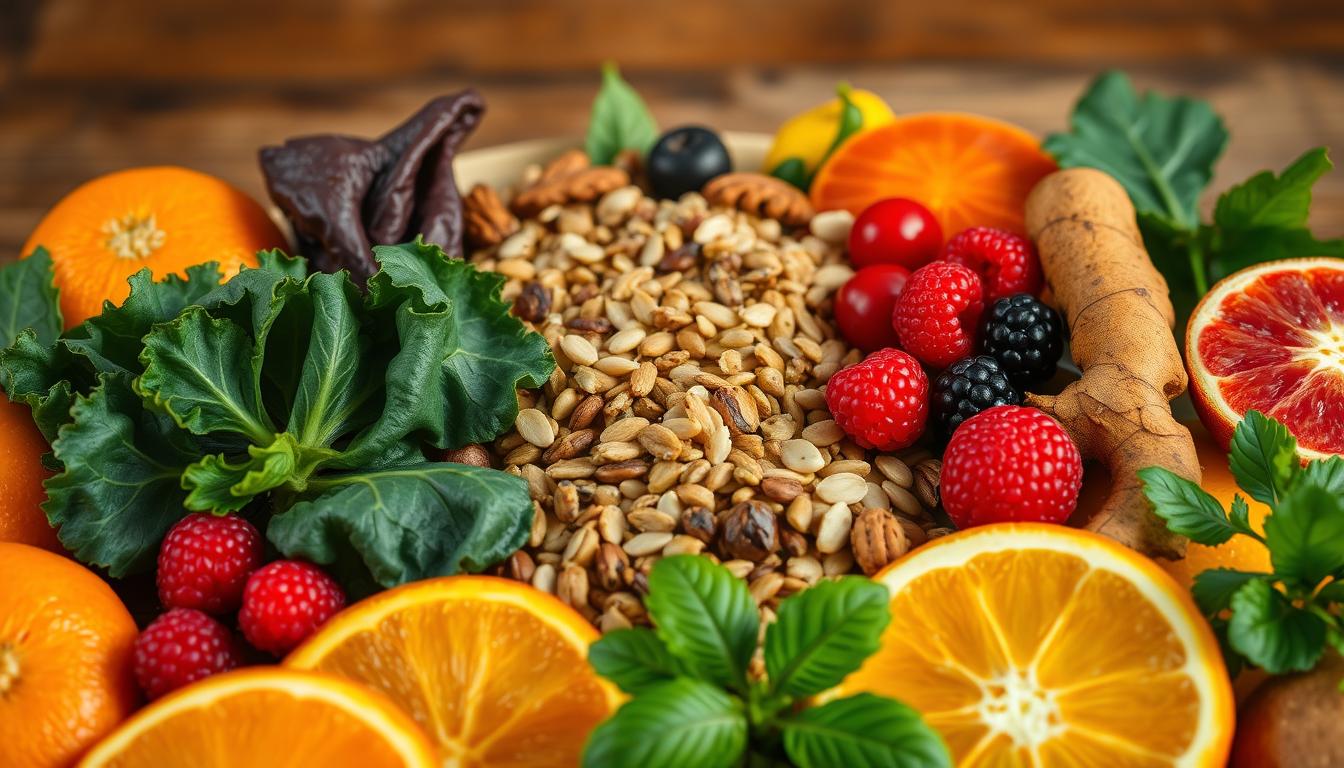

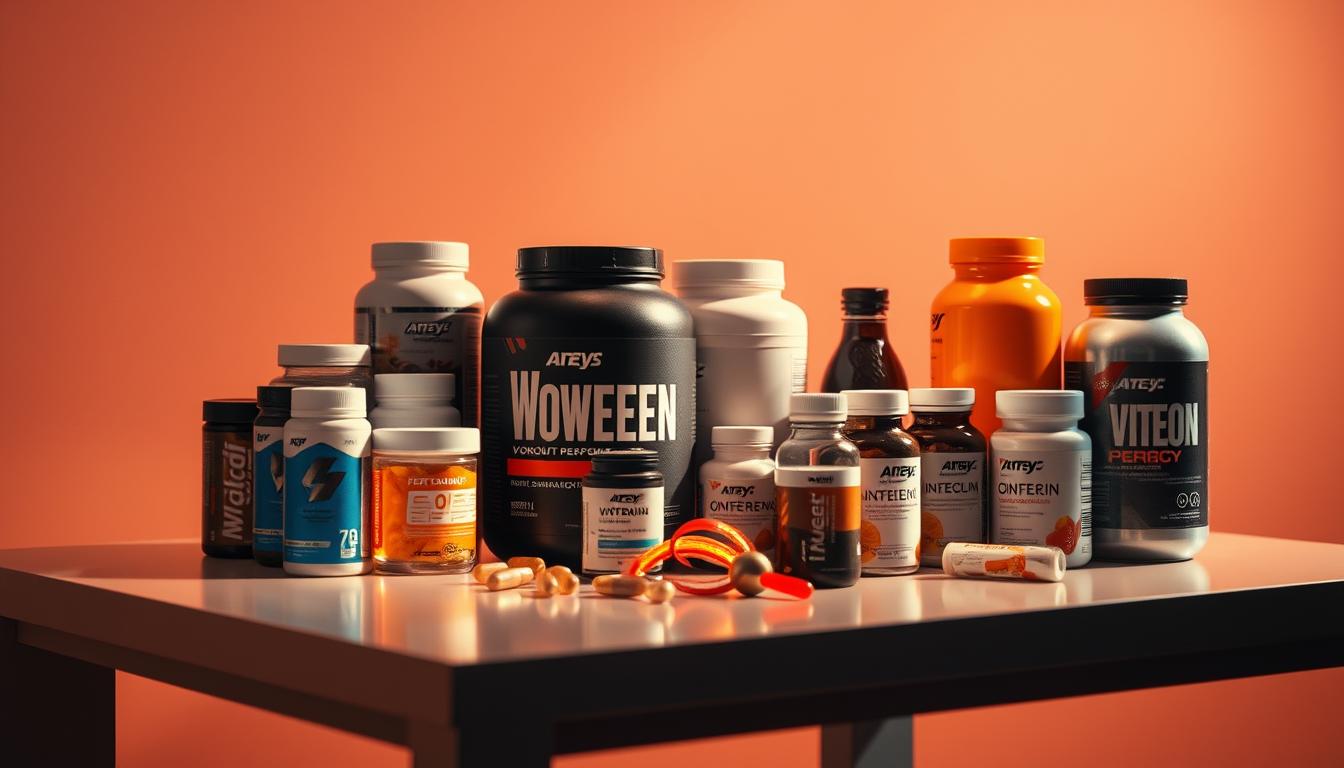
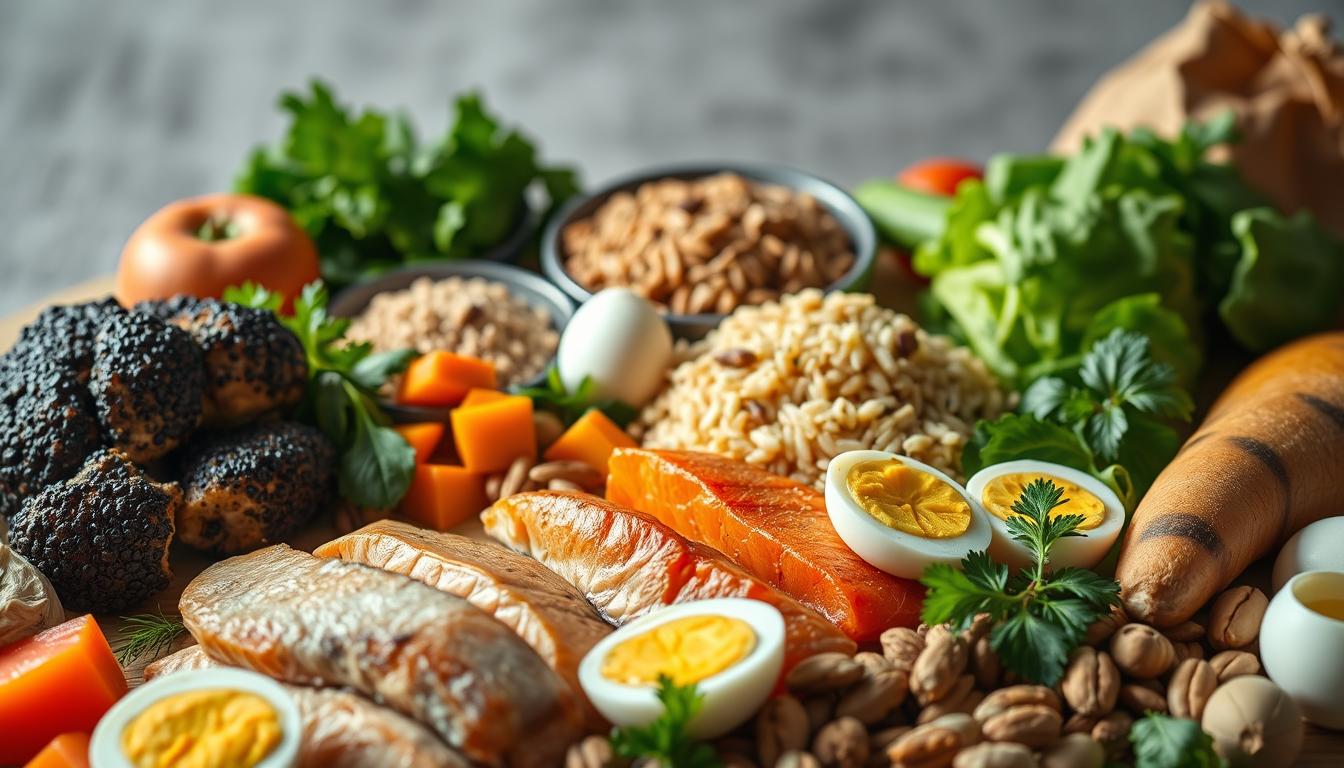

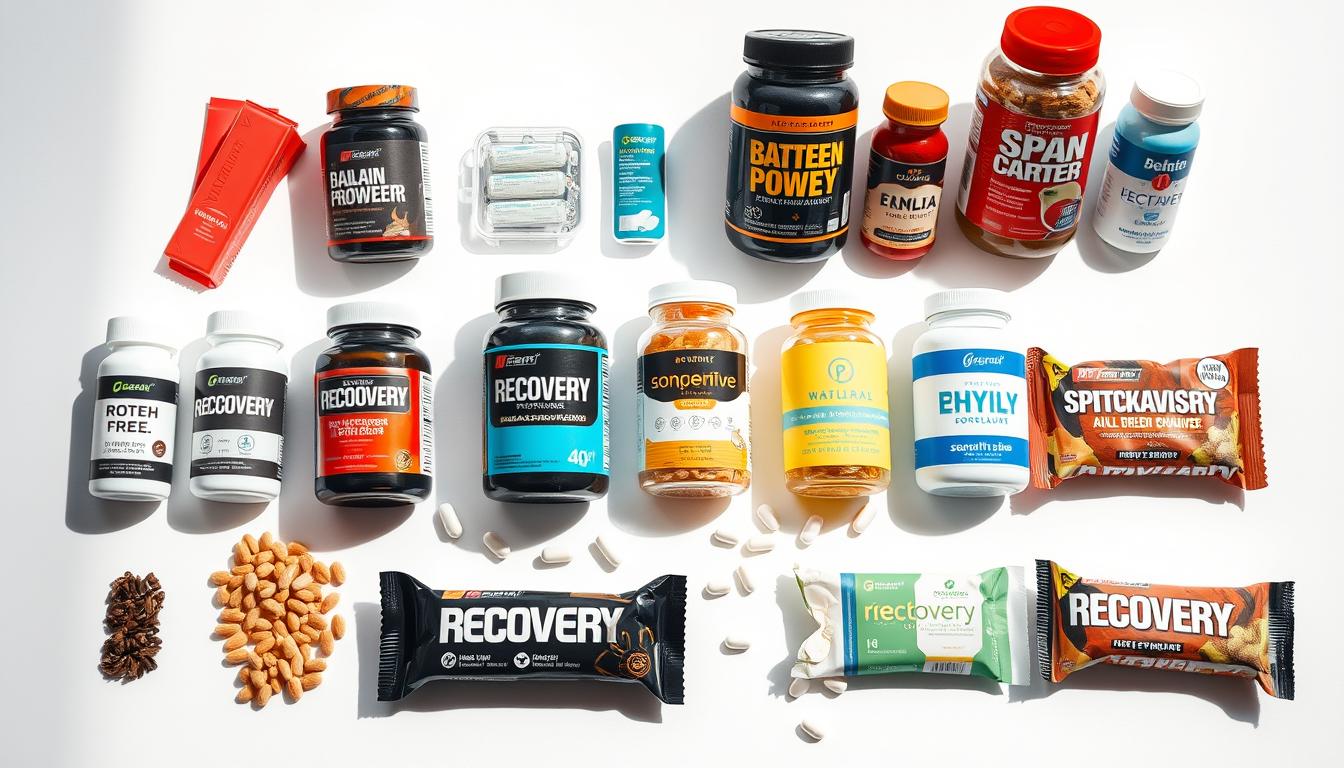
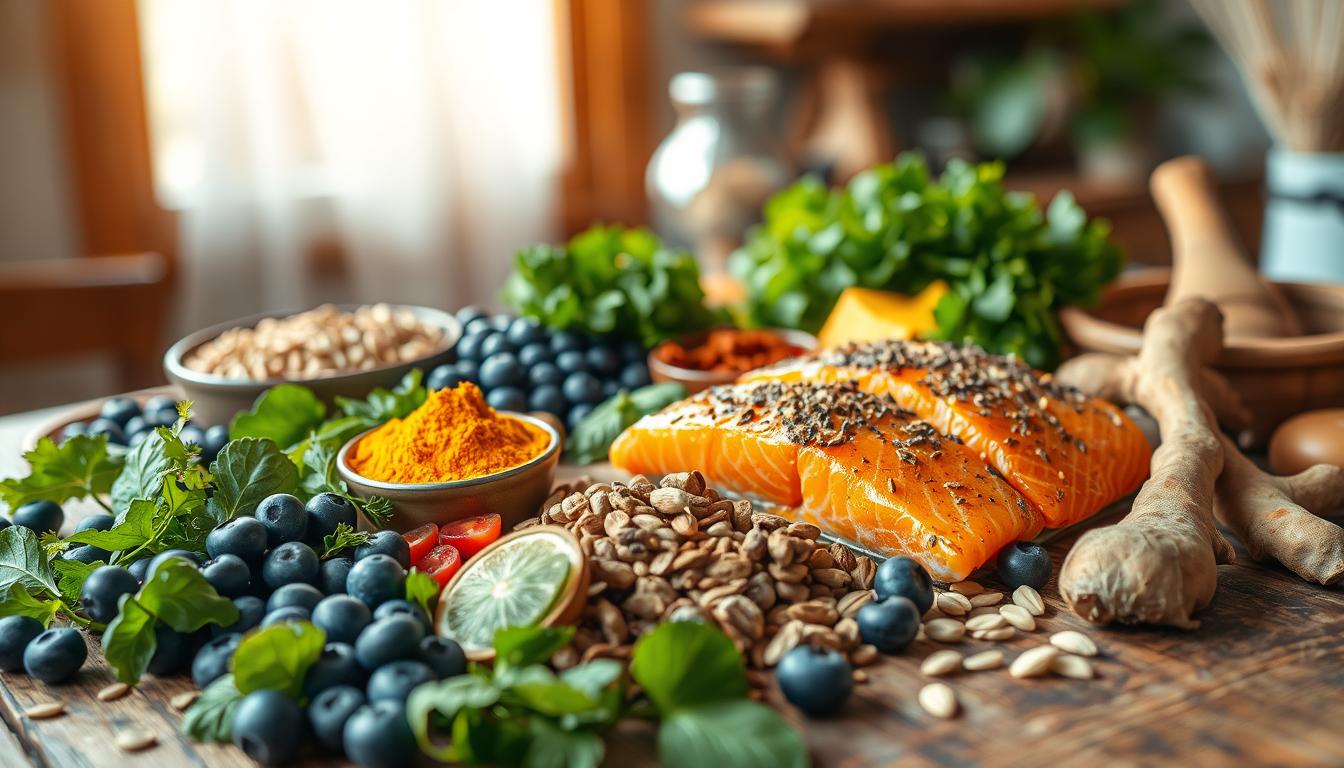
Comment on “Foods to Boost Immunity: My Top Picks for a Healthier You”